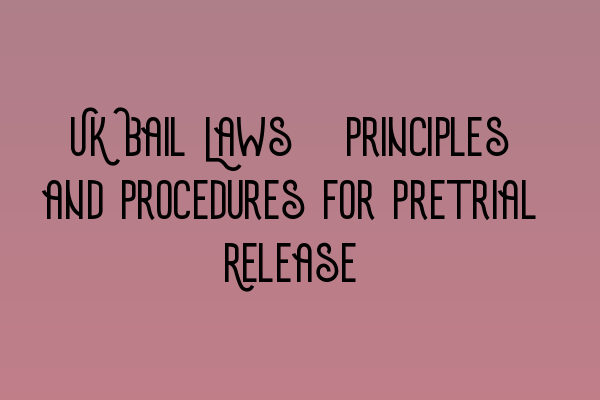UK Bail Laws: Principles and Procedures for Pretrial Release
The UK’s bail laws play a crucial role in the criminal justice system, providing a framework for pretrial release that balances defendants’ rights with the need to protect society. Understanding these principles and procedures is essential for solicitors and legal professionals involved in criminal law.
What is Bail?
Bail is a legal process that allows defendants to be temporarily released from custody while they await trial. It provides individuals with an opportunity to continue with their normal lives, consult legal counsel, and gather evidence for their defense.
There are various types of bail available under UK law, including police bail, court bail, conditional bail, and remand. Each type has its own specific requirements and conditions that must be met.
The Principles of Bail
The principles governing bail decisions aim to strike a balance between protecting the public and ensuring the fair treatment of defendants. The primary considerations include:
- Risk of flight – The court assesses the likelihood of a defendant fleeing the jurisdiction.
- Risk of reoffending – The court evaluates the probability of a defendant committing further crimes if released on bail.
- Safety of the public – The court considers whether releasing a defendant would pose a danger to society.
- Defendant’s rights – The court weighs the importance of the presumption of innocence against any potential risks.
These principles help guide judges in making bail decisions, ensuring a fair and just process.
The Bail Procedure
When a defendant is arrested, the police have the power to grant initial bail (police bail) pending further investigation. This allows the defendant to be released from custody under specific conditions. If the police decide not to grant bail or the alleged offense is serious, the defendant is held in custody until a court hearing.
The court then conducts a bail hearing to determine whether the defendant should be released on bail or held in custody (remanded). During the hearing, the court considers factors such as the seriousness of the offense, the defendant’s criminal history, the strength of the evidence, and any potential threats to public safety.
If the court grants bail, it sets conditions that the defendant must adhere to. These conditions may include surrendering their passport, residing at a specific address, reporting to a police station regularly, or refraining from contacting certain individuals.
Importance of Legal Representation
Given the potential impact of bail decisions on defendants’ lives, legal representation is crucial. Solicitors specializing in criminal law can provide valuable guidance and advocacy throughout the bail process.
They can help defendants prepare strong arguments for bail, gather supporting evidence, challenge bail conditions, and represent their best interests in court hearings. Having a skilled solicitor by their side can significantly improve a defendant’s chances of securing pretrial release.
Conclusion
Understanding the principles and procedures of UK bail laws is essential for solicitors and legal professionals involved in criminal law. By having a clear understanding of these laws, legal professionals can provide effective representation for their clients and navigate the bail process with confidence.
For more information on related topics, feel free to check out our other articles:
- SQE 1 Practice Exam Questions
- SQE 1 Practice Mocks FLK1 FLK2
- SQE 2 Preparation Courses
- SQE 1 Preparation Courses
- SRA SQE Exam Dates
